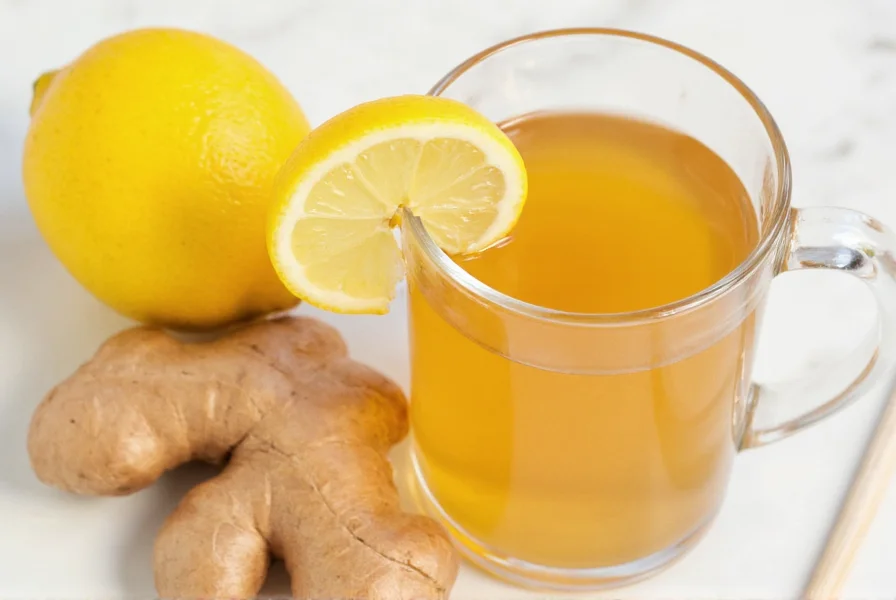For centuries, cultures worldwide have turned to ginger and lemon tea as a comforting beverage with potential health advantages. This simple combination of two natural ingredients has gained popularity as both a soothing drink and a potential wellness aid. Understanding what this tea actually offers—separating evidence-based benefits from popular claims—is essential for making informed choices about incorporating it into your routine.
The Science-Backed Benefits of Ginger and Lemon Tea
When examining natural remedies for digestive discomfort, ginger consistently appears in scientific literature. Research published in the Journal of Ethnopharmacology indicates that gingerols, the active compounds in ginger, may help reduce nausea and support healthy digestion. A systematic review of multiple studies found ginger effective for pregnancy-related nausea and motion sickness, with doses as low as 1 gram providing noticeable effects.
Lemon contributes vitamin C and flavonoids to this tea combination. While not a cure-all, the vitamin C in lemon supports immune function and acts as an antioxidant. The combination creates a beverage that's hydrating while delivering these beneficial compounds.
| Benefit | Scientific Support Level | Key Research Findings |
|---|---|---|
| Nausea relief | Strong | Multiple studies show ginger reduces nausea from pregnancy, chemotherapy, and motion sickness |
| Digestive support | Moderate | Ginger may accelerate gastric emptying and reduce bloating |
| Antioxidant properties | Good | Both ingredients contain compounds that combat oxidative stress |
| Immune system support | Limited | Vitamin C supports immunity, but tea alone won't prevent illness |
How to Prepare Ginger and Lemon Tea for Maximum Benefits
Creating an effective homemade ginger lemon tea recipe requires attention to preparation methods that preserve the active compounds. Many people make the mistake of using boiling water directly on lemon juice, which can degrade some beneficial compounds.
For optimal results when making fresh ginger and lemon tea for immunity:
- Peel and thinly slice 1-2 inches of fresh ginger root
- Simmer ginger in 2 cups of water for 10-15 minutes (do not boil vigorously)
- Remove from heat and let cool for 2-3 minutes
- Add the juice of half a lemon (about 1-2 tablespoons)
- Optional: Add a small amount of raw honey after the tea has cooled slightly

The simmering process extracts ginger's beneficial compounds without destroying them through excessive heat. Adding lemon after removing from heat preserves more vitamin C, which degrades at high temperatures. This preparation method maximizes the potential benefits of ginger tea with lemon for digestion and overall wellness.
What Research Actually Says About Health Claims
While many websites make bold claims about ginger and lemon tea for weight loss, scientific evidence remains limited. Some studies suggest ginger may slightly increase metabolism, but the effect is modest and shouldn't be considered a weight loss solution. A 2019 review in Nutrients found that while ginger shows promise for metabolic health, more research is needed to determine its specific effects on weight management.
Regarding ginger lemon tea for cold and flu symptoms, the evidence is more supportive. The warmth of the tea can soothe sore throats, while ginger's anti-inflammatory properties may help reduce discomfort. Lemon provides hydration and vitamin C, which supports immune function. However, no research indicates this tea can cure or prevent viral infections.
For those seeking natural remedies for morning sickness, ginger tea stands out as one of the better-supported options. Multiple clinical trials have demonstrated ginger's effectiveness for pregnancy-related nausea, with the American College of Obstetricians and Gynecologists acknowledging its use as a non-pharmacological option.
Safety Considerations and Appropriate Consumption
Ginger and lemon tea is generally safe for most people when consumed in moderate amounts. However, certain individuals should exercise caution:
- People taking blood thinners should consult their doctor, as ginger may increase bleeding risk
- Those with gallstones should be cautious with ginger consumption
- Individuals with gastroesophageal reflux disease (GERD) might find lemon exacerbates symptoms
- Pregnant women should limit ginger to 1 gram daily unless otherwise directed by their healthcare provider
The appropriate daily amount of ginger and lemon tea for daily consumption is typically 1-2 cups. Excessive consumption (more than 4 grams of ginger daily) may cause heartburn, diarrhea, or mouth irritation in some individuals. Remember that while this tea offers potential benefits, it shouldn't replace medical treatment for serious conditions.

Practical Tips for Incorporating Into Your Routine
For those interested in making ginger lemon tea for daily wellness routine, consider these evidence-based suggestions:
- Drink 20-30 minutes before meals to potentially support digestion
- Consume in the morning for a caffeine-free energy boost
- Avoid drinking too hot to preserve beneficial compounds
- Use organic ingredients when possible to minimize pesticide exposure
- Store fresh ginger in the freezer for easy grating when needed
Unlike many commercial herbal teas, fresh preparation allows you to control the strength and quality of ingredients. This approach maximizes the potential benefits of fresh ginger and lemon tea for health while avoiding unnecessary additives found in some pre-packaged options.
Frequently Asked Questions
How often can I safely drink ginger and lemon tea?
Most adults can safely enjoy 1-2 cups of ginger and lemon tea daily. The recommended maximum for ginger is approximately 4 grams per day, which translates to about 1-2 inches of fresh ginger root per cup. Those with specific health conditions or taking medications should consult their healthcare provider for personalized guidance.
Can ginger and lemon tea help with weight loss?
While some claim ginger and lemon tea promotes weight loss, scientific evidence is limited. Ginger may slightly increase metabolism and promote feelings of fullness, but these effects are modest. This tea can be part of a healthy weight management plan as a low-calorie beverage alternative to sugary drinks, but it's not a standalone weight loss solution.
When is the best time to drink ginger and lemon tea?
For digestive benefits, consume 20-30 minutes before meals. Many people enjoy it in the morning as a caffeine-free alternative to coffee. If using it for nausea relief, drink when symptoms occur. Avoid consuming too close to bedtime if you find it energizing. The ideal timing depends on your specific wellness goals and how your body responds.
Does ginger and lemon tea interact with medications?
Ginger may interact with blood thinners like warfarin, potentially increasing bleeding risk. It might also affect diabetes medications by lowering blood sugar. Lemon generally has few medication interactions, but its acidity could potentially affect how some medications are absorbed. Always consult your healthcare provider about potential interactions if you take prescription medications.
Can children drink ginger and lemon tea?
Children over 2 years old can typically enjoy small amounts of ginger and lemon tea, but consult a pediatrician first. For children, use less ginger (about 1/4 to 1/2 inch root per cup) and ensure the tea has cooled sufficiently. Avoid adding honey to tea for children under 1 year due to botulism risk. Ginger tea may help with childhood nausea, but professional medical advice should always come first for persistent symptoms.











 浙公网安备
33010002000092号
浙公网安备
33010002000092号 浙B2-20120091-4
浙B2-20120091-4